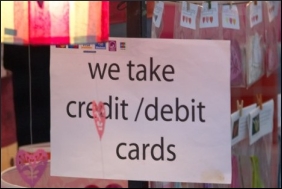|

|
Credit card companies try to make up for lost profit
|
|

|
|
| Top Stories |
 |
|
|
|
PR Newswire | 19 Jun, 2010
LOS ANGELES: Federal banking regulators are closely watching banks, as they try to find new credit card fee loopholes, while Americans struggle to settle their debt.
New restrictions on credit card fees are forcing banks to rethink their strategy by coming up with new and novel fees to charge their customers.
The Credit Card Accountability, Responsibility and Disclosure Act was passed in 2009. The Act was designed to adopt tougher regulations in the wake of America's economic crisis.
Corporations have responded by looking for creative ways to make up for lost profits.
First Premier Bank is charging their customers a $95 processing fee, often before the card is even used. Citigroup aware of the limitations on raising customer rates for late payments is lifting the interest rates in advance of customer payments and then offering a lower rate if the credit card bill is paid on time.
A Citi spokesperson, in response to criticisms raised by some consumer advocates that were reported in the Wall Street Journal, told us, "This rebate offer is clear, transparent, and we believe fully within the spirit of the Credit Card Act, this rebate is NOT a reduction or change in the customer's disclosed interest rate." They also confirmed that the customer sees the calculated, disclosed and charged interest rate in every rate communication they receive from Citigroup.
Despite the attempts to clarify the interest rate rise Morgan Drexen's CEO Walter Ledda is disappointed, "Once again financially stressed consumers are being expected to prop up profit at our nation's credit card companies." Ledda works tirelessly in the fight against debt and is calling for tighter regulations on credit card lending.
If consumers can't afford to pay a balance at a set interest rate raising that interest rate will lead them into further financial crisis.
Morgan Drexen works with attorneys to provide an alternative to the traditional debt settlement services. It provides an Internet based administrative support to attorneys representing consumers who face bankruptcy, which is often a result of high credit card interest rates and fees.
The Credit Card Accountability, Responsibility and Disclosure Act was passed in 2009. The Act was designed to adopt tougher regulations in the wake of America's economic crisis.
In February 2010 the increase of interest rates on outstanding balances was enforced with immediate effect, but the downside was that it could only be implemented in the first year.
Corporations have responded by looking for creative ways to make up for their lost profits.
|
|
|
| |
|
|
|
|
|
|
|
|
|
|
|
|
|
|
| |
| Customs Exchange Rates |
| Currency |
Import |
Export |
US Dollar
|
84.35
|
82.60 |
UK Pound
|
106.35
|
102.90 |
Euro
|
92.50
|
89.35 |
| Japanese
Yen |
55.05 |
53.40 |
| As on 12 Oct, 2024 |
|
|
| Daily Poll |
 |
 |
| Do you think Indian businesses will be negatively affected by Trump's America First Policy? |
|
|
|
|
|
| Commented Stories |
 |
|
|
|
|
|
| |
|